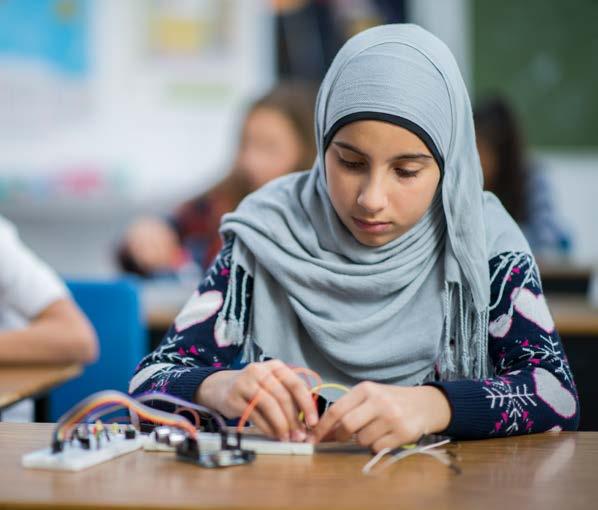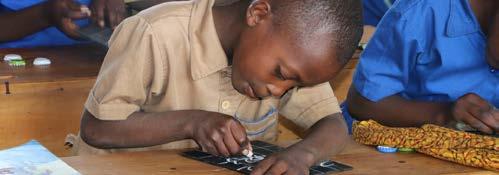Annual Impact Report 2021-22

































A world where everyone’s life is transformed through excellent education.
We strive to change education for good around the world, supporting leaders to raise standards, improve school performance, develop great teachers and open career pathways.
We have been researching and delivering programmes to improve education, from early years to post-school careers, since 1968. We develop evidence-informed solutions that draw on our continuous research to bring about real change, raise educational standards, support global efforts to address learning crises and reduce inequalities of opportunity.
EXCELLENCE in learning outcomes, our people, our solutions and our delivery
INTEGRITY in the way we build trust in and bring purpose to our work
ACCOUNTABILITY through rigorous and transparent assessment of our performance
COLLABORATION by working together across teams and in partnership with clients and customers to build capacity
INCLUSION both by encouraging diversity in our organisation and by serving those for whom education can have the most transformative impact
Our purpose at Education Development Trust – transforming lives through education – has never felt more important or urgent than it is now. Our impact over the last year shows that the work we do is increasingly, intimately linked with the global recovery and transformation agenda for education and skills. We have more than doubled our reach across schools and education settings globally, now working with almost 26,000 organisations, and in every interaction we understand and value the fact that we have another opportunity to advance learning.
We have helped tackle inequity in education in diverse ways this year, particularly in the vast learning gaps that widened during the Covid-19 pandemic, particularly where disadvantage is most present. We have been supporting teachers and school leaders to help pupils catch up in their learning in innovative ways, including tutoring. We have improved teaching quality and boosted learning outcomes cost-effectively, in an increasingly tough financial educational landscape. We have helped develop employability skills with children, adults and those navigating school-to-work transitions in an unsettling global economic context. We have contributed new insight into the global knowledge base of ‘what works’ in education.
The Covid-19 pandemic presented EDT with many challenges to reach our beneficiaries with frontline services. Schools were closed and careers services severely hampered by a lack of face-to-face engagement, but we adapted effectively with rapid conversion to online service delivery – capabilities we continue to invest in and grow. We are also now (thankfully) back squarely in front of learners, teachers and education leaders and, as this report shows, our reach and impact figures have rebounded incredibly strongly as a result. Last year, we reached 3.5 million learners. In 2021-22, that figure is over 9 million.

There are many highlights. The programmes we lead in Ethiopia and Sierra Leone are maturing, reaping dividends in terms of our impact on schools at scale and driving up our ability to contribute to closing equity and inclusion gaps, particularly for girls. We know that working at significant scale is an important aim, as it helps our clients’ money go further in service of our beneficiaries around the world.
In the UK, our portfolio of work has grown, particularly in relation to the government’s catch-up investment in tutoring and in support of early years teaching. The school-led tutoring programmes we deliver reach deep into those areas of the UK with the highest rates of disadvantage. Early years intervention is also vital, particularly to disadvantaged communities, given what we know about the profound challenges of learning loss in the development of young children – and that the earlier this is addressed for them the better.
The number of people we reach with our services is, of course, only part of the impact story. The critical dimension of impact that we seek to understand and grow is how well our interventions drive transformation - and what happens in the classroom and other learning environments as a result. Children in Ethiopian schools where we work are almost twice as likely to say that how much they learn at school has got ‘much better’, compared to other schools, reflecting, in simple terms, the kind of transformational impact we seek to deliver. In Kenya, 88% of the girls who wanted to transition to employment rather than continue their education had gained the insight and support to start their own businesses. This inspires us to continue to seek out more opportunities to deliver more and deliver even better.
Ilse Howling Chair of Trustees Education Development Trust

9.2 million learners
an increase of 155%
38%
are disadvantaged and vulnerable learners
We reached
77,500
adult learners and jobseekers through our employability and careers portfolio, up by 3%
181k educators reached
We engaged with
36,700 school leaders
Up by
278

We worked with 25,800 schools and other educational settings, including 391 technical and vocational training settings and higher education providers (100 more than in 2020-21) and 81 NGOs and donor agencies, a drop of 53. While the fall is attributed predominantly to the closure of our UNICEF Jordan programme and Connected Learning Centre in London, it was partially offset by our work in research and consultancy with NGOs, up from 22 to 50 this year. Meanwhile, we worked with 189 local delivery partners to bring our programmes to participants, up from 109 last year.
We launched 10 new programmes across the UK, the Middle East and Sub-Saharan Africa.


This has been an outstanding year in our ability to reach into schools to make a difference, often with more than one programme. The overarching theme of our work in the UK is to close the disadvantage gap. Our projects in England tripled their reach to 1.6 million learners in September 2022 (up from 500,000 the previous year) including 400,000 disadvantaged learners.
We are proud of the difference we make to the learning experience of children in schools in England, where we know learning gaps have widened, post-pandemic. This year, 24% of all learners touched by our programmes were from vulnerable and disadvantaged groups, although the proportion was even higher in certain programmes. Our Early Years programme impacted 36% disadvantaged groups, school-led tutoring 33% and Early Careers professional development 26%.
Primary-aged children who are not making expected progress at school – many of whom are from disadvantaged groups – are the key children targeted to receive school-led tutoring. These children are then significantly more likely to make ‘above expected progress’ in maths and English than those who are not on the programme.
18,000 school leaders were engaged in EDT programmes, up from 3,000 last year, a sixfold increase. Reaching increasing numbers of school leaders, who are ‘agents of change’ for improvement, enables long-term and sustainable impact both for learners and teachers. The programmes making the most significant contribution to this rise were the School-led Tutoring Programme, Schools Partnership Programme and Early Careers Professional Development Programme.
We supported almost 12,000 educational organisations – a rise from almost 4,000 in 2020-21. This includes schools and colleges as well as technical and vocational training and higher education and professional development providers, professional bodies and subject associations. Over 1,200 schools benefit from being supported by two or more projects run by EDT, providing a sustained approach to evidence-based school improvement.
We see the best outcomes achieved by working in collaboration and partnership with local providers of education services. EDT worked with almost twice as many local partners in 2021-22 as in the previous year.
The supportive and collaborative relationship between lead and partner schools on the Behaviour Hubs programme helps to create positive and sustainable behaviour cultures that benefit learners and teachers.
This is our flagship behaviour management scheme in England and the first year we have been able to report on the full impact of the programme. We know poor behaviour has a significant impact upon pupils’ learning experiences. Survey responses from a behaviour hub partner school show a reduction in teaching time lost to poor pupil behaviour and positive changes observed in behaviour management, consistency and clarity of processes and consequences. The number of suspensions for physical altercations or verbal abuse went down from 37 to 2.
applications from schools and multiacademy trusts
We have recruited more schools to our Behaviour Hubs programme, receiving 730 applications from schools and multi-academy trusts (MATs), with over 380 taking part in the Behaviour Hubs programme. 49 schools graduated from the programme in 2021-22.
We wish to continue the momentum we have built so far... We also aspire to become a future lead school to share our experiences and journey with others. – Headteacher, secondary school
In February [our school] was inspected by Ofsted and we were delighted to achieve a Good rating across all areas. I would like to express my thanks to the Behaviour Hubs programme and all involved. – Head of primary school
The Early Career Professional Development Programme, launched in November 2020, has now helped more than 9,000 early career teachers (ECTs) to develop their practice.
This year, the number of ECTs from geographical areas with high levels of disadvantaged pupils increased. 33% of teachers either work in schools with double the national average level of disadvantage or in the most sparsely populated areas of the UK, also known to have high levels of disadvantage.
Participants said the programme had a positive impact on student motivation, closing progress and attainment gaps for disadvantaged students, and improved pupil behaviour.
98% of Year 1 teachers said they are already using what they learn from training in their own practice.
The training is helping with retention in the profession: 95% of first year ECTs completed the year and will continue to Year 2 and gain qualified teacher status (QTS), compared with 87% of final year postgraduate trainees awarded QTS nationally.
According to participating teachers, the early career professional development training helped to:
80%
close the gap for disadvantaged students
89% 88%
improve progress and attainment increase student motivation
84%
improve pupil behaviour
In phase 2 of our Early Years Professional Development Programme, we provided flexible, high-quality, evidence-based and accessible online training directly to more than 1,300 early years practitioners - extending its impact to around 10,000 educators through cascaded CPD. This helped to build skills capacity and support local authorities to retain these essential educators – and give children the best start in life.
It has provided strategies and ideas that we are able to put into practice immediately, along with ideas for future planning. – EYPD participant
This programme has been excellent… We can see the benefits to the children and the passion coming through from the team. – EYPD participant
96%
of early years practitioners say their knowledge, skills and practice in early language and maths has improved.

Almost all participants think the training has improved children’s outcomes in:
Personal, Social and Emotional Development
The programme helps to increase school readiness in children aged between two and four, which significantly dipped during the pandemic. Up until now, we were contracted to deliver training in 65% of England’s local authority areas which have the highest levels of disadvantage. In phase 3 of training for early years practitioners, we will extend our reach nationwide. 94% 96% 93% Early Maths Speech, language and communication
Our first cohort, who began the six-year programme in 2016, proudly graduated in July 2022. The programme continues to provide support for maths and physics undergraduate ‘scholars’ who are about to start initial teacher training. 93% of Year 4 scholars are matched to a school which fulfils their specific needs before the end of the summer term. Importantly, scholars demonstrate higher quality teaching than nonparticipating teachers, according to our insight report into the programme.
We have maintained a 100% rate (on a par with last year) of scholars who completed their initial teacher training (Year 5), achieved qualified teacher status and were offered a teaching position, compared with the national figure of 87%.
We continue to be a lead provider for the Department for Education’s reformed National Professional Qualifications (NPQ). Our first cohort of participants started in November 2021. The impact of our NPQ, a formative evaluation, is measured by the responses of educator participants, whose objective is to raise pupil outcomes. In March, EDT hosted a national conference for delivery partners, which fostered collaboration and an opportunity to share best practice across all parties working together to support teacher development.
In 2021-22, the NPQ in Leading Teacher Development (NPQLTD) helped school leaders transform their settings by supporting teacher development. Participants strongly agreed that all EDT NPQs are providing them with the knowledge and skills they need to support their professional and career development. 97% of NPQ participants reported the training to be very useful for their professional goals.
In course feedback, participants said they felt: well supported by facilitators and online platforms the online platforms and training content are “easy to use and informative”
the course benefits professional development and future career progression
The support from the team is incredible. Every single conference I have been to I’ve walked away with an incredible passion for teaching.
– Tom Having, Scholar
It has been great for my professional development: I have already started to implement so many things into my daily practice. – Participant
The School-led Tutoring Programme trains school-based staff and tutors to help reduce gaps in progress and attainment for learners, most of whom are disadvantaged. Over 11,000 participants completed the programme in the year and are working predominantly in regions with the highest population of children eligible for the pupil premium, including Birmingham, Lancashire, Kent and Essex.

95% of tutors on the programme saw a positive impact in pupils’ readiness and motivation to learn, engagement, and confidence, both in the tutoring environment and school in general.
The outcomes for primary pupils who received school-led tutoring, compared to children who did not, were significant. In maths, reading and writing, the proportion of tutored pupils moving from ‘working below expected standard’ to ‘working at or above expected standard’ was significantly higher than in a control group of non-tutored pupils: in maths, there was a 27 percentage point difference and in reading it was close to 50 percentage points. In secondary schools, there was a significant increase in English attainment among girls who received the intervention (up 8%) compared with non-tutored girls (-1%). Among tutored Key Stage 4 pupils, significant improvements were observed in both maths (up 7%) and English (up 6%) while for nontutored cohorts the corresponding changes were at or below 1%.
By joining the tutoring programme, teachers gained new learning and skills to enhance their classroom teaching, cascading benefits to non-tutored pupils. Tutor training is also open to non-qualified teaching staff, widening the options for uptake of teaching qualifications.
The Schools Partnership Programme continues to provide coaching and support for senior and middle leaders, fostering collaboration and ongoing school improvement. This year, the programme has helped schools and leaders focus on learning recovery as we emerge from the pandemic.

In 2021-22, we extended the programme to deliver collaborative working support for multi-academy trusts (MATs) and expanded to new regions and clients, including in Wales, Lincolnshire and Kent.
In Kent, school leaders participated in a programme called ‘Peer Review for Improving Inclusion’. 89% said the training had really helped them understand the peer review process and 82% said they are ready to implement peer review in their own school.
The workshops that we had before the pandemic and the reviews that we did in that first cycle really supported us to deepen relationships that we already had and sustain this through more difficult times. It’s been brilliant and really helped us to focus on what is the priority in our schools... and the impact that has on our children. –
Sarah Walker, CPD Coordinator - LearnAT89%
said the training has helped them to gain good understanding of how the peer review process could work in their own setting.
86%
said they had improved their leadership skills through the training, and now felt ready to lead peer review in their own schools.

The number of learners, businesses and employers who engaged with our employability and careers services more than doubled in 2021-22, which we attribute to London-based careers learning projects growing and working at full capacity following the pandemic. We also added three new projects to our portfolio this year.
311,000 were young people and 76,500 were adults
135%
140%
42% of all learners were from vulnerable and disadvantaged groups, which remain the priority audience for our interventions.
We worked with 500 more educators in the careers advice phase than last year, now reaching over 3,000. In addition to over 1,800 teachers and 863 school leaders, our Careers Clusters in London worked with 475 volunteers to support apprenticeship learning in schools – an important strand to help embed the opportunities presented by apprenticeships for soon-to-be school leavers.
The number of schools and other education settings that we support increased by 25% to over a thousand. This includes over 300 in technical and vocational education and training (TVET) and in higher education.
Our National Careers Service (NCS) work continues to recover from the disruptions of the pandemic, supporting tens of thousands of individuals to develop the skills and confidence they need to get back into work, identify their next steps, or re-train. Our advisers help clients build an action plan, improve their interview technique, develop application writing skills and consider their transferable skills, while also finding local training opportunities and focusing on all the elements that enhance their employability.
Covid-related restrictions, which required services to be delivered virtually, contributed to a 20% decline in reach in 2020-21. This year, however, we helped 80,400 clients access high-quality, impartial careers information, advice and guidance and helped them take their next steps, up by more than 11%.
Our Making a Difference programmes have expanded this year. We continue to support economically inactive and unemployed residents in the ‘Coast to Capital’ region of the South East of England, helping 271 people back into work, up from 231 in the previous year. We launched new Making a Difference teams in the North East and in Leeds.
In the first six months of operation, the North East and Leeds teams recruited 761 participants, of which 138 have been supported back into employment and 195 have progressed to searching for jobs independently.
We launched the Leeds Reach programme in February 2022 and will report on its impact in the next year. The programme aims to move people aged 15-24 who are not in education, employment or training in Leeds into sustainable occupations.
The programme gave me a new start in life. – Making a Difference client
Through North East Ambition (NEA) we support and advise small and medium enterprises (SMEs) who are experiencing skills gaps and shortages. There has been steady uptake: by July 2022, 327 SMEs and micro-businesses had registered with and received support from the team.
NEA helped 136 businesses to identify their skills gaps: 85 businesses (62%) and 273 individuals say they achieved their business goals thanks to NEA support and advice. 100% of those who used the service agreed it had had a positive impact.
NEA is helping women to enter sectors where they are currently under-represented and supporting SMEs whose work aims to benefit certain groups, such as ex-offenders and families with SEND.
Cassidy Forsythe specialises in producing 3D models and 2D drawings for planning applications and road and drainage design. The company wanted to grow but skills shortages in the construction industry were hampering their efforts to take on new business.
NEA skills facilitators helped the company find four new staff members, as well as support existing apprentices through CPD opportunities and promotional events.
I am already talking to clients about taking on new work due to having new, skilled workers. – Martin Young, Director at Cassidy Forsythe
Our ‘Inspiring Careers’ team provides schools and local authorities with careers information, education and guidance and also supports work experience placements. We worked with 101 schools and colleges this year, the largest reach yet, and organised 547 work experience placements for young people, some of which were innovative virtual placements which enabled young people to connect to job opportunities nationally.
17,200 young people benefitted from the schools’ programme, during which we led 3,600 careers advice and guidance days, a 36% increase from 2020-21. After using the service, 99% of supported students felt clearer about their career plans and what educational pathways to take in order to achieve them.
Our traded careers advice services are also reaching learners with special educational needs and disabilities (SEND) across eight schools. The programme has been commended by the Quality in Careers Consortium for its strong consultancy and assessment model, vision, and strong relationships with education authorities.

There is synergy and support between the programmes we run across London, connecting schools and education providers with excellent careers information and guidance and targeting people most in need of support to map their future.
Our Apprenticeship, Support and Knowledge (ASK) teams worked with people from key groups on special programmes, such as a summer school for those identified as at risk of being not in education, employment or training (NEET).
We have increased the number of Year 13 students gaining higher or degree apprenticeships from 2 or 3 to 25-30 a year. – Careers Leader, Chislehurst and Sidcup Grammar School
86% of teachers said they now know much more about apprenticeships and how to help learners apply for them and 5,108 young people have registered on the UK government’s ‘Find an Apprenticeship’ portal, to start their journey towards training for work.
This year, ASK reached over 130,000 young people in 352 schools and 83% more parents and carers than 2021.
Our Careers Clusters bring together local schools, colleges, employers and higher education institutions to support careers preparation and reduce the numbers of young people who are ‘not in education, employment or training’ (NEET). We have reached:
of our target to connect with learners in Croydon and Hillingdon.
After participating in activities through a careers cluster:
93% 73% 80% 84%
of students say they are learning new things about careers and work.
of our target to develop teachers’ careers and labour market knowledge.
of students understand more about employment and career pathways, and what they want to do.
The team on one of our newest programmes, West London Careers Hub (WLCH), established productive links between London businesses and schools. Enterprise advisors liaised with 84% of schools in the West London area, using the Gatsby Benchmarks to help them standardise and improve careers education and guidance.
Beneficiaries include students with special educational needs and learners in pupil referral units who are connecting with nearby workplaces to develop an understanding of their future skills and career opportunities.
According to our research, 79% of students understood what skills and qualifications were needed for different kinds of careers and training. 88% of students said WLCH events helped them understand their options much better.
It has been absolutely amazing to hear how skilfully and quickly you develop a rapport with our pupils. They all felt empowered and confident. – Teacher
have gained] greater insight into the challenges facing schools and students.
Highly engaging sessions which helped to motivate students.

[I
– Employer
– Teacher
Schools supported: Up from 263 to 395
School leaders developed: Up from 341 to 829
System decisionmakers engaged: Up from 42 to 120
Learners who benefit: Down from 922,000 to 565,000
In November 2021, we completed our year of involvement with the Jordanian Ministry of Education’s Learning Bridges programme, run with support from UNICEF. This scheme enabled 825,000 children to continue to learn during school closures caused by the pandemic and provided professional development for teachers and leaders across Jordan, with an emphasis on creativity, innovation and sustaining improved quality of teaching and learning.
The programme widened access to and provided continuity of education for the most economically disadvantaged learners. Although the end of the programme contributed to the drop in learners reached by us this year, it has a sustained impact. Structures are now in place that help the ministry’s educators to integrate real-world examples with a cross-curricular approach; use technology flexibly, including sharing printed rather than online materials in situations where online connectivity is low; improve teachers’ skills and knowledge in blended learning and technology; and build collaboration for learning between homes, communities and schools.
of students say they want to keep using Learning Bridges when they return to school, according to a UNICEF study
The success of Learning Bridges led to further work in Jordan with UNICEF to build resources and train staff in the country’s 200 Makani centres. Makani – meaning ‘my space’ – are safe places for over 40,000 children of all ages to learn, play and gain skills to support their progress in formal education. We helped to provide education continuity and mitigate the disruptions of Covid-19, including lost learning and disengagement, for people in the most disadvantaged communities.
Surveys showed that more than 90% of students were engaged or very engaged in activities; while 98% of facilitators said they felt confident delivering sessions thanks to the training, structured lesson planning and materials that they now use. Students said Makani centres enhanced their enjoyment of learning, as well as their reading skills, confidence, motivation and participation, and improved their academic performance at school.
Future Ready – a careers education pilot programme in Jordan’s secondary schools – targeted 500 students (particularly marginalised learners) and empowered them to engage with their families and directly with employers to make positive careers choices. The scheme inspired greater recognition among learners of the importance of maths, English and digital skills in the labour market and challenged local genderstereotyped perceptions of working roles. An innovative research and development project drawing on our vast expertise in UK-based careers education, one of the distinctive and highly successful features of Future Ready was increased employer engagement.
83% of students said the programme helped them prepare and plan their future career and 90% of those who had work-based opportunities, such as workshadowing, said they understood better the skills and qualifications they would need in certain jobs. Girls and boys reconsidered which – if any – jobs are more suited to men or women (78% of students challenged their own previous thinking on this) and 73% gained better understanding and appreciation of vocational pathways than before. Almost 90% of parents said their children were more motivated in school since starting the Future Ready programme.

Learning Bridges made the role of teacher a mentor and made learning focused around the student.

–
Teacher, Amman (UNICEF)
In this region, most of the system-level decision-makers that we reached came through the Alexandria Schools Trust programme. The number of beneficiaries in Jordan and Lebanon remained relatively stable at 4,000 Syrian refugee children (300 fewer than the previous year) while we continued to provide exceptional teaching and learning support – plus a wellbeing focus – to refugee communities. We continued to build English skills, teacher collaboration, evidence-based supervision capability and gender-responsive practice to enable learning and extend reach. Many EDT colleagues volunteer to join online English-speaking classes, to help participants practise the language. Almost 70% of people on our English Language Development course said they gained better strategies and language to help them reach marginalised learners.
In Brunei, we continued to build capacity and deliver English language teaching for educators flexibly – including face-to-face, in professional learning communities and online – helping to develop learners’ English throughout the country’s state schools and sixth form colleges. We recruited almost 200 high-quality teachers, ensuring that 98% of Brunei’s English language teachers are qualified to grade 3 or above on the teacher performance appraisal scale. 153 teachers took part in our Peer Partnership Programme, to mentor and share professional knowledge: 93% of participants rated the programme highly.
EDT organised training events, including online courses and peer-learning networks, helping the Bruneian Ministry of Education to develop new assessment-for-learning methodologies for English language. Teachers can use these to track student progress and modify their teaching in response to the evidence.
We have continued to address significant learning loss caused by the pandemic’s disruptions to education. Early indications for 2022 show that around 60% of learners reached age-related expectations in reading – up from 35% in 2020-21. Our programme aims to accelerate the catchup needed, through methods including continuous professional development and highly accurate measurements of student progress.
Quality assurance and school inspections are at the heart of our work in the Middle East and accountability is embedded in our global programmes.
In 2021-22, we provided inspection services in education settings for eight organisations across the Middle East and Asia, including the UK’s Department for Education (DfE), the Knowledge and Human Development Agency (KHDA) which oversees private schools and early years education in Dubai, and the ministries of education in Thailand and United Arab Emirates (UAE).

There was significant disruption to our inspection work throughout the pandemic, including lack of access to the schools we work with. Last year, however, we inspected 224 schools, the same as in 2019-20, engaging with almost 500 education leaders, over 9,000 teachers and reaching 221,000 learners.
We continue to develop our use of technology to support accountability processes across education settings and for education leaders – both local and national – to access data and insights to inform their decision-making.
EDT made a significant contribution to the new UAE School Inspection Framework with the Ministry of Education. Inspectors helped to trial the framework, which will shape how schools are inspected in the future and the quality of education provision. Our early years specialists also visited settings as part of a relatively small pilot of the new Early Years Framework. The outcomes will impact how inspections of settings are carried out in the future and will support the development and progress of children across the UAE.
We also supported the Ministry of Education with monitoring visits to 18 schools which had had lower inspection outcomes on previous visits, to evaluate improvements in their progress and the impact on outcomes for their students. Teaching colleagues and schools benefitted from EDT capacity support and our maths inspectors’ expertise.
We completed 23 British Schools Overseas (BSO) and International Schools Quality Mark (ISQM) accrediting visits in the UAE and Thailand. These not only ensure students receive a good quality education but allow them to transfer to schools in other countries of a similar standard, giving them portability of education and a wider range of opportunities.
In the Emirate of Sharjah, we undertook improvement review visits in 101 schools, in which we engaged school leaders in professional dialogue to lead change, upskilling 12 local inspectors during the visits. Our input not only raises standards for quality of education, but also helps local inspectors improve compliance in areas like health and safety and safeguarding.
Educational organisations involved: Up from 4,300 to 12,200
System leaders supported: Up from 3,000 to 3,700
Educators reached: Up from 58,000 to 110,000
Learners who benefit: Up from 1.9 million to 6.5 million
Across Sub-Saharan Africa, our portfolio has grown from three to five large-scale projects in the last year, connecting with learners and educators in schools and communities. We work in Ethiopia, Rwanda, Kenya, Sierra Leone and Zimbabwe, where training for high-quality teaching and leadership is central to our programmes to transform learning outcomes.
By extending our reach to 84,000 teachers and 16,700 school leaders, we have tripled the number of learners who benefit from our learning and engagement programmes.
The UKAid-funded Girls Education Challenge (GEC) programme in Kenya, which moves into a sustainability phase from March 2023, supports girls to transition between education phases (primary, secondary and careers) and has now reached a total of 254,000 learners, of which 80% are disadvantaged or marginalised. Girls are comprehensively supported in school, in their community, at home, in girls’ clubs and through personal development. Members of girls’ clubs improved their learning performance, confidence and aspiration towards studying science, technology, engineering and maths (STEM) subjects. Over half now choose to take biology, chemistry or physics. Work is progressing to retain the 5% of girls in rural areas who dropped out of education during school holidays.
As well as improving academic, access and training opportunities and outcomes, the programme develops girls’ awareness of their own socioemotional wellbeing, resilience and sexual and reproductive health: knowledge that helps them remain in education. Girls’ survey responses reflected an increase in self-confidence in their own agency to mitigate barriers to development of their future, rising within six months from 89% (in March 2021) to 93%. Almost 100% said that teachers make them feel welcome in the classroom and explain new concepts well.
GEC provided bursaries for almost 4,000 girls to re-access education and for 265 to enter technical and vocational education or training. We gave out 144 business start-up kits for girls who had completed their TVET courses: 88% of these girls started their own community businesses and can support themselves and their siblings or families with the proceeds.
Improvements in literacy and numeracy outcomes for GEC beneficiaries are higher than Kenyan national averages. In October 2021, we measured project outcomes and school support and the results showed impressive progress in numeracy – up an average of 11.5 points – and literacy – up 5 points.
More than 3,000 primary and secondary teachers are now trained in coaching skills (1080) and gender-responsive pedagogy and safeguarding (2,000). The impact of almost 500 new remedial teaching roles in primary schools generated a 30% improvement in learning and performance, according to teachers and pupils.
All projects support leader–teacher collaboration thorough professional learning communities, mentoring and peer-to-peer coaching. Recent EDT research on communities of practice across our programmes showed that regular sharing of expertise leads to improvements in teachers’ skills, competences and professional practice, including:
• self-efficacy
• confidence and motivation
• resilience and flexibility
• subject knowledge.
Through TEACH in Zimbabwe, another UKAid-funded programme, we focus on enhancing teacher effectiveness and professional development as the means to improving outcomes for all children. Although we had to delay schoollevel delivery of this programme until September 2022, the project still made progress, working collaboratively with national stakeholders, building capacity and co-designing teacher and leader training programmes.
The TARGET project in Ethiopia has grown at great pace, providing training and support to over 9,000 school ‘leaders of learning’, up from 600 last year in the pilot phase. Through TARGET, we now reach 4.5 million learners; in 2020-21 it was 158,000. This programme therefore accounts for a huge proportion of the growth in benefits that school leaders bring to their teachers and pupils.
School leaders who have undertaken TARGET national senior leadership training – compared to those not in the TARGET programme – demonstrate significant improvements in the quality of school improvement planning, teaching for learning, safeguarding, lesson quality, data use and management and in teacher attendance. In intervention schools, there were greater improvements across all metrics compared to those not on the programme, particularly in treating boys and girls equally. Competency assessment results show that the proportion of school leaders at the level of ‘competent leader’ or above rose from 15% to 74%.
Student agreement with the statement, ‘There are special places in our school where girls can go to feel safe and protected’ rose by 54 points from 43% to 97% in TARGET intervention schools (but dropped to 29% in non-intervention schools). 21% of intervention schools indicated there had been significant improvements in data management and use, compared with no indication of improvement in control schools. 45% of students in TARGET schools said they are learning ‘much better’ than before, compared to 25% of students in other schools. Assessments show that 98% of school leaders are either ‘at’ or ‘above’ minimum proficiency.
Our projections indicate that we will reach more than 5.5 million beneficiaries by the end of the programme in 2023. TARGET partners also report that, because we are providing training in how to plan lessons effectively for learners with special educational needs and disabilities (SEND), learning connections with this group rose by almost 10%.
The Building Learning Foundations (BLF) programme has three components: teacher training, leadership training and system reform, which includes educational data information and management systems.
EDT delivers the UKAid-funded programme in Rwanda, reaching 44,000 professionals, including training for over 3,000 school leaders, via online accredited courses and coaching. In its latest annual review in 2022, FCDO maintained the programme’s ‘A’-rating. The established evidence for benefits to girls’ education in Kenya has led to an extension to the BLF programme, which has rolled out a pilot of 21 girls’ clubs across Rwanda.
During the four years of the BLF programme, teaching proficiency and leadership skills have continually improved:
• 57% of maths teachers are now at benchmark proficiency levels (an increase from 27% in 2018).
Primary school pupils have increased their overall English proficiency by 14 percentage points.
• 51% of English teachers are at benchmark proficiency (an increase from 10% in 2018).
• 54% of teachers have now achieved benchmark competency in teaching methodology (exceeding a contractual target of 40%)
• After completing the CPD course in leading learning, 94% of headteachers are benchmarked as competent leaders (exceeding a contractual target of 90%)
• Over 90% of headteachers now attend monthly Professional Learning Community meetings.
BLF is improving learning outcomes for boys and girls in all our primary schools – Gaspard Twagirayezu, Minister of Education, Government of Rwanda
BLF has shown great flexibility in responding to COVID-19, the new language of instruction and the education system expansion over the last two years, facilitated by the expertise within the consortium and assisted by strong collaboration and relationships with all partners in the education sector – FCDO Annual Review 2022
We also extended our support into local community management and support for schools. As part of the BLF programme, 3,200 school general assembly committees developed their governance functions. These community projects have also been key to changing local social perceptions of education, leading to investment in girls’ education and training.

EDT is working in partnership with UNICEF in Sierra Leone to train almost 40% of the country’s primary teachers in foundational literacy and numeracy, to improve outcomes for 600,000 children. So far, the EGRAM programme’s reach has exceeded UNICEF’s targets, training 180 professional development facilitators, who have cascaded the programme to over 5,000 teachers in 1,386 schools across three administrative regions in the country. Monitoring teachers’ progress through the training modules reveals that literacy scores improved by 83% and maths by a huge 474%.
83% Teachers’ literacy up Teachers’ maths up
474%
We put our knowledge – gained from work in teacher development – into practice through our ownership and management of independent schools: St Andrew’s School and Oakfield Preparatory School in England, and the International School of Cape Town, South Africa. The Independent Schools Inspectorate described our UK schools as ‘excellent’.

St Andrew’s pupils’ results in standard assessment tests (SATs) were 29% higher in maths and 21% higher in reading than the national average. The school moved up nine places to 35th place in the annual Sunday Times ‘Parent Power’ survey of the top 100 UK independent schools.

St Andrew’s provides all-round support and education, investing in ICT, wellbeing and in its community links. The school hosted a joint team-building day and delivered weekly French language sessions at a local infant school which previously could not offer French to its children.
Children joining Oakfield School are academically in line with the national average but during their time at Oakfield, they go on to exceed national standards: 13 percentage points higher in reading and maths at KS1 and KS2. All pupils, including all children with SEND, were offered places at the senior school of their choice.
Oakfield was commended by the Independent School Teacher Induction Panel (IStip) for excellent provision and support for early-career teachers (ECTs). Pupils had some brilliant experiences and outcomes in competitive games and community performance and became the Independent Schools Association’s national gymnastics winners.
The school welcomes parental engagement and external speakers, who have highlighted medical and health issues, such as Early Childhood Trauma, Moebius syndrome and visual impairment, leading to whole-school fundraising of £2,000 for the charity VICTA.
We have a structured, evidence-based approach to innovation, focusing on scale to reach as many beneficiaries as possible. In 2021-22, we applied our innovation methodology to three key education challenges.

To empower school leavers to be better prepared for the world of work, we developed the pilot for Future Ready, a career guidance and career readiness model for young people. We worked closely with the Jordanian Ministry of Education and local partners to codesign Future Ready, rolling it out in eight schools with 500 learners. The positive findings – about students’ confidence, decision-making, interest in vocational sector and motivation to learn – support our aims to take the programme to scale as we continue to engage with the ministry and other partners.
Applying our incubator innovation model to identify bright spots and best practices, we have built a suite of tried and tested, evidence-based tools and resources to support our leadership for learning proposition. These tools include our leadership for learning competency framework and professional development model. In 2021-22, we doubled the number of educators on our development programmes in Sub-Saharan Africa, including 16,700 school leaders, of which 2,600 are female.
We have applied a girls’ education lens across all our programmes to identify and consolidate how we reach marginalised girls and work towards a more gender-equitable society. Our organisation now has a strong and recognisable girls’ education portfolio of programmes which we can track, measure and improve against key impact metrics. By 2022 – either directly or through teacher professional development – we have reached 554,000 girls globally in their education, 84% of our of 2024 target.
We continue to build capacity for girls’ educational impact by developing and testing the genderresponse teaching toolkit in Jordan and Lebanon, to deliver benefits across all our programmes.

The scale of our consultancy business has grown substantially. Our research and consultancy teams provided high-quality support and inputs in many countries for a range of clients, including the Foreign, Commonwealth & Development Office (FCDO), UNICEF, Norad, the Inter-agency Network for Education in Emergencies (INEE), the British Council, Wellcome Trust, Tatweer Company for Educational Services and the World Bank.
Beneficiaries of our work include more than 40,000 learners, plus 265 educational organisations and 209 system leaders and policymakers. Most of our projects had a capacity-building element to them and a focus on learning recovery post-Covid-19. About a third of our work continues to be about providing evidence products to support decision-making, policy-formation and reform. Our surveys show that 100% of our clients say they are likely to use our services again.
Beyond our consultancy work, we published four research reports, which shared findings from research focused on teacher management in refugee settings and further reflections on learning recovery post-Covid-19.
In the largest of our key technical focal areas, we recently supported FCDO with the pilot of the What Works Hub for Global Education. We experimented with a range of programmes designed to support education decision-makers to engage with evidence, explored the strength of evidence ecosystems and developed tools for mapping these, as well as amplifying the reach, accessibility and utility of existing research evidence.

Mind the Gap has become one of the most downloaded INEE resources. The comprehensive nature of the report makes it a go-to resource on girls’ education in crisis contexts.– INEE
EDT’s products have been important for informing [our] portfolio thinking and strategic emphasis in broader partner dialogue.– Norad

As the restrictions imposed by the pandemic eased, we enjoyed more opportunities to meet and present our learnings face to face.
We attended the UKFIET conference on international development and education, ‘Building Back Better in Education and Training? Reimagining, Reorientating and Redistributing’. Colleagues shared expert knowledge about girls’ education, research methods, teacher professional development and school leadership with participants from over 60 countries.
EDT senior leaders attended EXPO 2020 (delayed due to the pandemic) and the World Innovation Summit for Education (WISE) in Qatar, at which we presented sessions on system leadership, girls’ education and women in leadership. We co-hosted a knowledge-sharing conference on school leadership in Sierra Leone and EDT was a silver sponsor at the Education World Forum in London in Summer 2022.
In Kigali, Rwanda, we hosted the first ever National Symposium on Girls’ Education, which brought together more than 100 education sector delegates to consult and share learnings on barriers affecting girls’ education and ways to address them. Project team-members from our Sub-Saharan Africa programmes promoted the benefits of professional learning communities.
At our first Delivery Partner National Conference in the UK, Early Career Professional Development Programme and National Professional Qualifications (NPQ) delivery partners met to collaborate and share best practice for training delivery. Delegates found the opportunity highly collaborative and productive, saying:
It was a pleasure to attend the @EDT DP Conference. So many things to take away and develop in partnership.
– HISP Teaching School Hub
The Rwanda Basic Education Board (REB) formed a learning partnership with EDT, WISE and the Education Commission to undertake rapid research on school and system leadership during the pandemic. In winter 2021, the research results from this innovative collaboration – The Rwanda Learning Partnership: Insights on School and System Leadership During COVID-19 – were released alongside an accompanying policy brief, Bridging the Evidence to Policy Gap: A Learning Partnership Approach to Research.
We co-convened a consultation with UNESCO and Brains Africa on UNESCO’s Global Education Monitoring Report. In a joint research report, produced by EDT and IIEP-UNESCO, we examined a critical aspect of inclusive education in refugee contexts, entitled Effective Teacher Management in Jordan. The Jordan report was followed by one on Kenya as part of a series of four studies in refugee contexts.
Our case study, Transforming Teacher Professional Development, describes the practical steps taken to improve teacher professionalism, applicable in many countries to nurture a high-performing and highly motivated education workforce.

We launched a podcast series entitled ‘Brighter Futures’, in which senior stakeholders at EDT discuss key topics, such as leadership for learning and evidence for policy and practice, with external guests. Its audience includes policymakers and consultants for government ministries, charities and trusts who inspire positive changes to education policy worldwide.


Our latest inclusion and diversity (I&D) survey was completed in summer 2022. Responses indicate that our strategy and the approach we have taken to implement it are having a positive effect.
EDT staff were more positive about all areas of inclusion in 2022 compared to 2020-21. 95% of respondents believe that EDT values and embraces diversity.
We set up three ‘special interest groups’ (SIGs) for staff to jointly promote company-wide understanding of ethnicity, gender equality and LGBTQ+. 96% of respondents who attended SIGs said the groups provided a safe space to learn and express views.
However, disaggregated data shows female colleagues felt less valued and less listened to than male colleagues; colleagues in some offices felt they had less opportunity to succeed than in others. There was variation among people in different ethnic groups in their perception of whether EDT is fulfilling its commitment to being an anti-racist organisation, their ability to relate to leaders and their ability to voice their opinion without fear of negative consequences.
We registered for the UK Government accreditation scheme Disability Confident and joined Inclusive Employers, the leading membership organisation for employers who are committed to prioritising inclusion and creating truly inclusive workplaces.
Our I&D taskforce is focused on areas for improvement. Individual and group experiences feed into our response: inclusion requires that every voice matters.
more staff engaged with this year’s survey
increase in staff perception of inclusion regarding neurodiversity
I love the special interest groups and think they are run professionally and with respect. I feel very welcomed in the groups and I find it very interesting to hear other people’s stories.


Maintaining high staff morale and wellbeing is one of our eight strategic priorities. In 2022, we were shortlisted for the Culture Pioneer Wellbeing Award, in recognition of our work to improve and support wellbeing across our organisation.*
Our team of trained Mental Health First Aiders is growing. In addition, we are encouraging activity for wellbeing, such as our Global 5k events; providing financial wellbeing training; enabling free use of Headspace, the mindfulness app, for all employees; and reviewing our occupational Health & Safety position through a wellbeing lens. 76% of staff (834 unique visitors) have visited our Learning Hub’s health and wellbeing pages. We run a hybrid working model so our employees can take more control of their work-life balance.
Responses to our staff survey, ‘Pulse’, show that employee satisfaction has continued to improve, moving from +64 in 2019, to +80 in 2020 and subsequently scoring +82 (December 2021).
In September 2021, we implemented Workplace Adjustment Plans, so we can explore how best to support a person’s disability, long-term ill health or neurodiversity. We held more than 30 workplace adjustment discussions with new starters to understand their wellbeing and health needs and have introduced at least 12 plans.

Our safeguarding and reporting procedures are embedded throughout the organisation, ensuring a consistent approach and vigilant culture.
Throughout 2022, we undertook a cycle of policy reviews to ensure consistency, with particular focus on Dignity at Work, Inclusion and Diversity, Code of Conduct, the Disciplinary Policy and related procedures.
We reviewed safer recruitment procedures and made two significant policy changes relating to checks on criminal records, approved by the Corporate Safeguarding Committee. These will help to ensure that EDT is recruiting and employing suitable and safe individuals to work with our pupils, programme participants and communities.
We increased dedicated safeguarding capacity in Sub-Saharan Africa by nominating a safeguarding champion within teams, to complement the work of the designated safeguarding lead (DSL). The impact is a more cohesive approach to safeguarding locally and an enhanced serious incident reporting procedure, enabling DSLs to develop their knowledge and confidence as evidenced by prompt reporting and effective case management, and a greater understanding of safeguarding responsibilities across all programmes in the region. In our programmes, too, we have seen improvements in safeguarding: in our TARGET schools, 47% of school leaders indicated strong improvements in safeguarding (compared with 17% in other schools) and their students were 93100% likely to say they always feel safe at school, compared to 50% in other schools.
The global safeguarding community of practice continues to positively impact our safeguarding culture and compliance, ensuring that our policies and procedures are positive, inclusive and beneficial for the diverse communities that we work in.
In November 2021, we published a UK Carbon Reduction Plan with a four-phase roadmap for achieving UK Net Zero. UK emission data for 2021-22 shows an 8% reduction in emissions from fuel combustion (gas and fleet vehicles) and a 92% reduction in emissions from electricity purchased and used by EDT, compared to 2020-21 emissions data.
We procure electricity generated by wind and hydro assets matched to Renewable Energy Guarantees of Origin (REGOs) for our UK sites. In 2021-22, 98% of EDT’s UK electricity was from 100% renewable sources, compared with 80% in 2020-21, saving 85.1 tonnes of carbon emissions in 2021-22 (compared with 78.8 tonnes the previous year).
Travel constituted 66% of recorded emissions for 202122. To mitigate this, over the last few years we have implemented hybrid working for employees where feasible. In preparation for an increase in business operations following the pandemic, we reviewed and relaunched our travel policy and our sustainable development policy. Although, as expected, emissions for 2021-22 were higher than last year, they remained 70% lower than pre-pandemic levels.
A growing number of our programmes across the world follow bespoke sustainability plans, to track and reduce negative environmental impact and share good practice with employers and partners.
lower travelrelated emissions compared to 2019
T